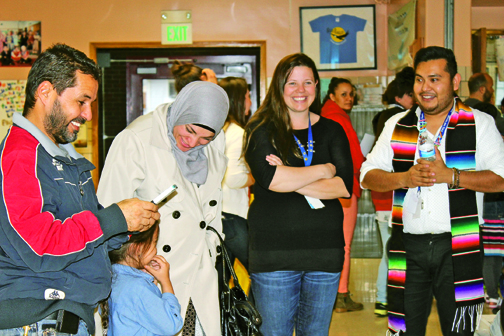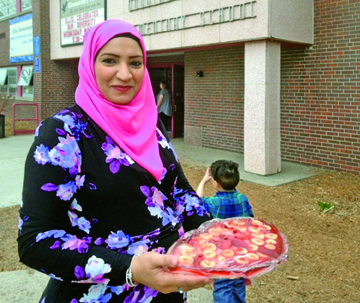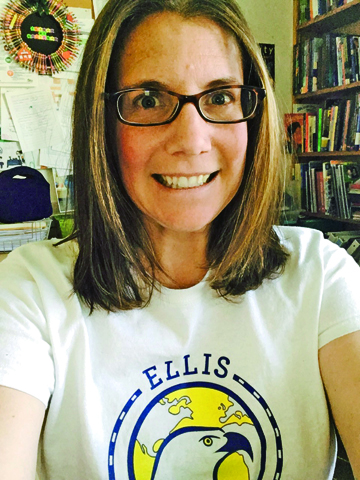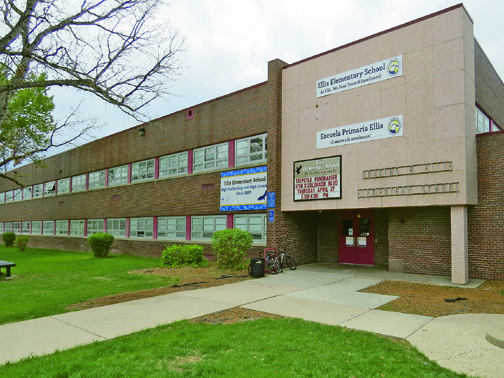by Ruthy Wexler
 Residents of Virginia Village treasure the “back in time” feeling of their neighborhood, which was built in the 1950s. Ranch and split level-style homes, typical of that period, dot the quiet streets. There’s even a neighborhood school set back upon a wide lawn: Ellis Elementary.
Residents of Virginia Village treasure the “back in time” feeling of their neighborhood, which was built in the 1950s. Ranch and split level-style homes, typical of that period, dot the quiet streets. There’s even a neighborhood school set back upon a wide lawn: Ellis Elementary.
Ellis, however, is not typical of the 1950s.
While that decade was marked by conformity, roughly half the students at Ellis hail from countries other than the U.S.
In the 1950s, differences were kept under wraps. Not so at Ellis, where even as staff welcome newcomers to the American way of life, they encourage them to remember their own.
“We feel diversity is what made America strong. We know it is what makes Ellis stronger,” declares principal Nichole Whiteman, whose students hail from the nearby neighborhood — and from China, Mexico, Thailand, Ethiopia, Iraq, and a host of other far-flung places. “Our community is smarter, richer, more joyful and simply better because of our diversity,” Whiteman insists.
Some months ago, absorbing news of travel bans, Whiteman sat down with a few of her teachers and pondered how they could honor the school’s population. Ideas became a vision. Shortly thereafter — at 5:30 p.m. on March 22 — Ellis’s front doors opened to eager crowds. Ellis Elementary Celebrates our Diversity: A School without Borders Event had begun.
An Amazing Night
Ellis parent Mark Ginkel arrived in a kilt that bespoke his Irish ancestry. Baidan Alameri, in a fuchsia hijab, carried in a strawberry pink dessert. Other delicacies brought by parents — flan, magrud, kunata — made the cafeteria one of the evening’s most popular stops, beside the art exhibit, the Family Portraits and the resource fair, complete with immigration attorneys, healthcare workers  and representatives from the Denver Art Museum.
and representatives from the Denver Art Museum.
In the lobby, Ellis students introduced themselves on a video. “My name is Ibrahim; I speak English and Arabic because my family is from Morocco.” “My name is Alex, I speak Burmese because my family is from Burma.” The tag line was what each child wished others knew about their culture; e.g., “I wish you knew that in our culture, we ride elephants.” One little girl said, “I wish you knew that Mongolia is similar to America.”
In the auditorium, young authors read original compositions. A rapt audience heard 10-year-old Jadea Swindler proclaim, “I want to be a singer and a dancer … Never give up, what you want and what you dream for!”; Karla Lozano and Ruth Rosas ask, “Promise me something, never judge someone by their color or the language they speak” and two high school boys recite earnest poetry: “This is not a revolution of hate and revenge/ It’s a revolution of love, of justice. … This is my American dream.”
Giddy with goodwill, attendees beamed at each other in the halls. “It was an amazing night,” Whiteman recalls. “There was such a feeling of hopefulness and togetherness. I hope to fill the halls of our school with that feeling every single day.”
The Whole Picture
Whiteman has her work cut out for her. Besides endeavoring to create a veritable Peaceable Kingdom, she’s got to worry about test scores.
In the Denver school system (DPS), children take annual tests which compare their academic knowledge with same-age peers across the state. Schools are given a numerical rating based on the average of all their students’ scores. When educators speak of “high” or “low performing” schools, this rating is what they mean. But how can Ellis — with many students fresh from traumas like poverty and a sudden absence of the familiar, with a good chunk of them grappling with English as their new language — be rated accurately?
School ratings are posted without comment. For its low score, Ellis wins only a C- from Greatschools.org, only one star from Schooldigger.com. (A more comprehensive analysis on the DPS site ranks Ellis only as “challenged.”)
But if one looks (clicks) further, reviews voicing profound satisfaction stream into view. “My son has attended Ellis since 3rd grade. He is a GT [Gifted/Talented] student … I cannot say enough about the teachers’ abilities and drive to educate … “
“This is a school full of wonderful teachers and committed staff. It is a school for learning ….”
“This school is a GEM!! I have had opportunities to send my son to different schools but elected to keep him at Ellis due to their ability to keep him academically challenged … “
“Unfortunately,” Whiteman observes, “when a school is judged primarily on one standardized assessment and that’s what gets publicized, people are missing a huge piece of the puzzle.”
Building Character As Well As Test Scores
Which is not to say Whiteman doesn’t place importance on testing. “We work hard to increase academic outcomes … Our local data show that our students are improving.
“We soar toward excellence in academics and also in character development,” she emphasizes. “We teach values: integrity, perseverance, curiosity, optimism, respect and compassion.”
“I like how they focus on character development,” says Jim Moody, whose son is in second grade at Ellis. “It permeates every part of the school.”
Former Ellis parent Steve Garcia attests, “My son learned leadership as well as academics.”
Another parent states, “At Ellis, I know [my child’s] emotional well being is taken into account by every adult he comes into contact with.”
A Noble Experiment
It seems almost too great a coincidence that Ellis Elementary shares the name of the famous immigrant gateway in New York. Whiteman notes, “It’s wonderful to see friendships where the color of skin or religion is clearly just not a factor.”
Some parents see how such friendships can shape their child’s future. One writes, “At Ellis, my son has the opportunity to navigate cultural and linguistic differences. The connections he makes because of this cannot be taught, they must be lived and experienced. I feel confident he will leave with a dedication to humanity that will prepare him for the challenges of our global community.”
Brooke Webb, who recently became the Director of Ellis’s Parent Teacher Organization (PTO), agrees that Ellis affords rare opportunities. “A few years ago when our daughter was Kindergarten age, we turned to Ellis because we like supporting our neighborhood school. Then Olivia began and I got really impressed: academic excellence and this amazing celebration of diversity!”
Webb would like more of her neighbors to see Ellis’s  value. For though the school is located in Virginia Village, families don’t have to send their kids there.
value. For though the school is located in Virginia Village, families don’t have to send their kids there.
Choosing Ellis
“Within DPS, parents have this thing called choice,” Webb explains. “They can choose any school within the system. Many parents choose schools that have more white faces.”
There are common misconceptions, Webb says. “People say, ‘Don’t you feel funny being the minority?’ But we’re not; there’s like 20 percent of everything represented. The majority/minority paradigm doesn’t have a chance to get started! And, ‘Isn’t your child held back because all the attention goes to the kids who don’t speak English?’ But the truth is, there’s no additional time given to kids learning English. They get that in language development classes.
“Our belief in our choice is reinforced by all the terrific ben efits we see Olivia getting.”
efits we see Olivia getting.”
Right now, Ellis Elementary is supported by dedicated staff, a recently revived PTO and a population that draws equally from a stable neighborhood and a changing world. The school faces challenges. Gentrification may close affordable housing in the area. Low test scores might dissuade potential parents.
“But we love the school and we’re up to it,” Webb says. “I see strollers on the streets here, so many kids who’ll be school age soon. I want to educate them! I want to tell them just how great their neighborhood school is.”
